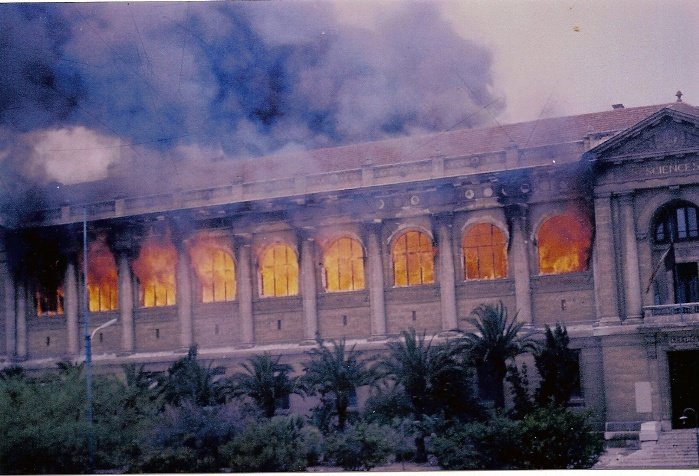ALGIERS – Tuesday (June 7) will mark the 60th anniversary of the fire at the University Library of the Faculty of Algiers, a cultural crime perpetrated by the Secret Armed Organization (OAS) with the complicity of the colonial authorities, and which provoked the destruction of 400,000 priceless works and manuscripts just days before the recovery of national sovereignty, on July 5, 1962.
On June 7, 1962, less than a month before the proclamation of national independence, three phosphorus bombs, placed by OAS terrorists in the building housing the Algiers Faculty Library, exploded around 12:40 p.m., causing a fire that destroyed a documentary fund of 400,000 works out of a total of 600,000 priceless books and manuscripts and ransacked the science laboratories and two amphitheatres. The rest of the documents, some 200,000 books that could be saved, were transferred to the Lycée Okba in Algiers, then recovered by the University Library two years later.
This crime, which targeted the cultural and scientific wealth of one of the oldest and most important libraries in the Arab world and in Africa, adds to the series of genocides and crimes against humanity and against Algerian memory, in the framework of the plan of enfumades used by the French army in the extension of the policy of the “scorched earth”, in particular after the victory of the Algerian diplomacy during the negotiations of the Evian Accords. A triumph for which the colonial army took revenge by burning the library, a symbol of the memory of the Algerian people, a few days before their departure from Algeria.
Yves Courrière, a historian close to the ultras, wrote in the edition of the day after the attack in the right-wing newspaper, Le Figaro: “June 7, 1962, a plume of smoke crowned Algiers. The University Library had just blown up. 600,000 books were burning… We weren’t going to leave them -our-culture and our science”.
“An arson attack ravages the university… three phosphorus grenades exploded in the library as well as near the staff lounge, the chemistry and science lecture halls and the pathology laboratory, the perpetrators of the attack had used in addition to the incendiary devices of the cans of gasoline”, wrote the newspaper “Le Monde” of June 9, 1962.
For its part “France-Soir” reports: “the wealthy bourgeois of rue Michelet (current Didouche Mourad) contemplate the enormous smoke from the flames which devour the university library where 600,000 volumes are burning, two amphitheaters and the laboratories of the Faculty of Sciences “.
The firefighters were able to control the fire according to testimonies which report that they directed the lances towards the parts not affected by the fire, drowning the books, because a large part of the collections that the fire spared were destroyed by the water, even if the pretext given was to prevent the fire from spreading.
The day of June 7 was decreed “National Day of the book and the library” under the terms of the presidential decree N 21-250 published in the JO 41. This day is celebrated each year through the whole of the national territory, through the organization of events and activities on books and the promotion of the role of the library in society.
This day was celebrated in consecration of the role of knowledge and culture in the formation of generations.





